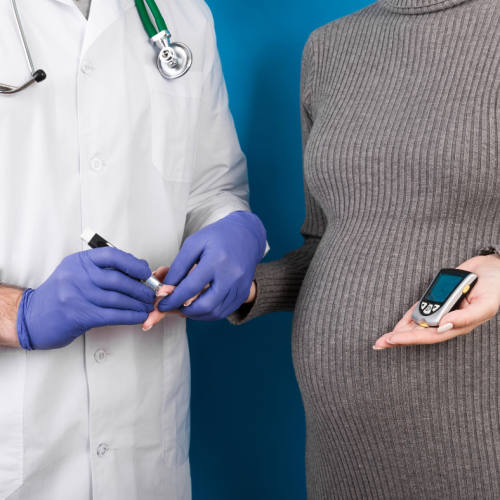Gestational Diabetes
Gestational diabetes is diabetes that is first diagnosed during pregnancy (gestation). Like other types of diabetes, gestational diabetes affects how your cells use sugar (glucose). Gestational diabetes causes high blood sugar, which can affect your pregnancy and your baby’s health.
Symptoms of gestational diabetes
Most often gestational diabetes does not cause noticeable signs or symptoms. Increased thirst and more frequent urination are possible symptoms.
Causes of gestational diabetes
Researchers do not know exactly why some women develop gestational diabetes and others do not. Possible causes may include:

- Hormones – Various hormones ensure that blood sugar levels are kept in check. But during pregnancy, hormone levels change, making it harder for the body to process blood sugar efficiently. This causes blood sugar levels to rise.
- Obesity – Having a high BMI during pregnancy increases the risk of various pregnancy complications, including gestational diabetes.
- Genetics – Women who develop gestational diabetes are thought to have underlying insulin resistance and genetic susceptibility. If someone in your immediate family has diabetes, you may have a genetic predisposition.
- Geographic location – Geographic location (e.g., urban vs. rural) affects environmental factors such as screening and diagnostic strategies used, access to health information and education, and a balanced and healthy diet.
- Age – Advanced maternal age may be a factor.
- HIV – HIV infection and antiretroviral therapy lead to dysregulation of glucose metabolism and are associated with an increased risk of glucose intolerance and metabolic disease. There is evidence that antiretroviral therapy, particularly first-generation protease inhibitors, leads to insulin resistance in both pregnant and non-pregnant women.
- Ethnicity – Studies suggest that blacks, Indians, and people of mixed race may be at higher risk for gestational diabetes.
What puts you at higher risk for developing gestational diabetes
Risk factors for gestational diabetes include:
- Being overweight or obese
- Not being physically active
- Having prediabetes
- Having had gestational diabetes during a previous pregnancy
- Having polycystic ovary syndrome
- Having an immediate family member with diabetes
- Having previously delivered a baby weighing more 4.1 kilograms
- Being of a certain race or ethnicity, such as Black
Treatment of gestational diabetes
Treatment for gestational diabetes includes:
- Lifestyle changes
- Blood sugar monitoring
- Medication, if necessary
Lifestyle changes
The way you eat and exercise is an important factor in keeping your blood sugar levels in a healthy range. Doctors do not usually advise losing weight during pregnancy – your body is working hard to support your growing baby. But your doctor can help you set weight-gain goals based on your pre-pregnancy weight. Lifestyle changes include:
- Healthy diet – A healthy diet focuses on fruits, vegetables, whole grains, and lean protein, foods rich in nutrients and fiber and low in fat and calories, and limits highly refined carbohydrates, including sweets.
- Staying active – Regular physical activity plays an important role in any wellness plan before, during and after pregnancy. Exercise lowers your blood sugar. An added bonus is that regular exercise can help relieve some common pregnancy ailments such as back pain, muscle cramps, swelling, constipation and sleep disturbances.
Blood sugar monitoring
During pregnancy, your doctor may ask you to check your blood glucose levels four or more times a day – first thing in the morning and after meals – to make sure they are within a healthy range.
Medication
If diet and exercise are not enough to manage your blood sugar levels, you may need to inject yourself with insulin to lower your blood sugar. A small number of women with gestational diabetes need insulin to reach their blood sugar goals.
Close monitoring of your baby
An important part of your treatment plan is to closely monitor your baby. Your doctor may check your baby’s growth and development with repeated ultrasounds or other tests.
Follow-up after delivery
Your doctor will check your blood glucose levels after delivery and again in 6 to 12 weeks to make sure your blood glucose levels are back in the normal range.
